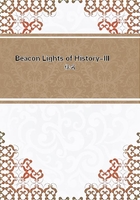
第7章
The Christians were forbidden to build churches, or speak openly of their religion, or sit in the presence of a Mohammedan, or to sell wine, or bear arms, or use the saddle in riding, or have a domestic who had been in the Mohammedan service. The utter prostration of all civil and religious liberty took place in the old scenes of Christian triumph. This was an instance in which persecution proved successful; and because it was successful it is a proof, in the eyes of Carlyle, that the persecuting religion was the better, because it was outwardly the stronger.
The conquest of Egypt rapidly followed that of Syria; and with the fall of Alexandria perished the largest library of the world, the thesaurus of all the intellectual treasures of antiquity.
Then followed the conquest of Persia. A single battle, as in the time of Alexander, decided its fate. The marvel is that the people should have changed their religion; but then, it was Mohammedanism or death. And a still greater marvel it is,--an utter mystery to me,--why that Oriental country should have continued faithful to the new religion. It must have had some elements of vitality almost worth fighting for, and which we do not comprehend.
Nor did Saracenic conquests end until the Arabs of the desert had penetrated southward into India farther than had Alexander the Great, and westward until they had subdued the northern kingdoms of Africa, and carried their arms to the Pillars of Hercules; yea, to the cities of the Goths in Spain, and were only finally arrested in Europe by the heroism of Charles Martel.
Such were the rapid conquests of the Saracens--and permanent conquests also--in Asia and Africa, under the stimulus of religious fanaticism, until they had reduced thirty-six thousand cities, towns, and castles, and built fourteen thousand mosques.
Now what are the deductions to be logically drawn from these stupendous victories and the consolidation of the various religions of the conquered into the creed of Mohammed,--not repudiated when the pressure was removed, but apparently cherished by one hundred and eighty millions of people for more than a thousand years?
We must take the ground that the religion of Mohammed has marvellous and powerful truths, which we have overlooked and do not understand, which appeal to the heart and conscience, and excite a great enthusiasm,--so great as to stimulate successive generations with an almost unexampled ardor, and to defend which they were ready to die; a religion which has bound diverse nations together for nearly fourteen hundred years. If so, it cannot be abused, or ridiculed, or sneered at, any more than can the dominion of the popes in the Middle Ages, but remains august in impressive mystery to us, and even to future ages.
But if, in comparison with Christianity, it is a corrupt and false religion, as many assume, then what deductions must we draw from its amazing triumphs? For the fact stares us in the face that it is rooted deeply in a large part of the Eastern world, or, at least, has prevailed victorious for more than a thousand years.
First, we must conclude that the external triumph of a religion, especially among ignorant or wicked people, is not so much owing to the purity and loftiness of its truths, as to its harmony with prevailing errors and corruptions. When Mohammed preached his sublimest doctrines, and appealed to reason and conscience, he converted about a score of people in thirteen years. When he invoked demoralizing passions, he converted all Arabia in eleven years. And does not this startling conclusion seem to be confirmed by the whole history of mankind? How slow the progress of Christianity for two hundred years, except when assisted by direct supernatural influences! How rapid its triumphs when it became adapted to the rude barbaric mind, or to the degenerate people of the Empire! How popular and prevalent and widespread are those religions which we are accustomed to regard as most corrupt!
Buddhism and Brahmanism have had more adherents than even Mohammedanism. How difficult it was for Moses and the prophets to keep the Jews from idolatry! What caused the rapid eclipse of faith in the antediluvian world? Why could not Noah establish and perpetuate his doctrines among his own descendants before he was dead? Why was the Socratic philosophy unpopular? Why were the Epicureans so fashionable? Why was Christianity itself most eagerly embraced when its light was obscured by fables and superstitions? Why did the Roman Empire perish, with all the aid of a magnificent civilization; why did this civilization itself retrograde; why did its art and literature decline? Why did the grand triumphs of Protestantism stop in half a century after Luther delivered his message? What made the mediaeval popes so powerful?
What gave such ascendency to the Jesuits? Why is the simple faith of the primitive Christians so obnoxious to the wise, the mighty, and the noble? What makes the most insidious heresies so acceptable to the learned? Why is modern literature, when fashionable and popular, so antichristian in its tone and spirit?
Why have not the doctrines of Luther held their own in Germany, and those of Calvin in Geneva, and those of Cranmer in England, and those of the Pilgrim Fathers in New England? Is it because, as men become advanced in learning and culture, they are theologically wiser than Moses and Abraham and Isaiah?